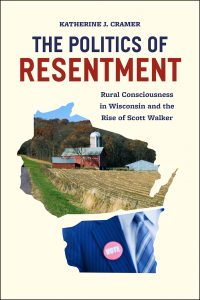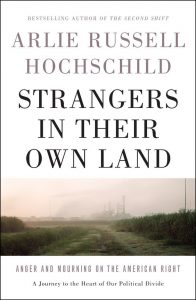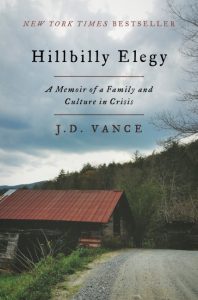Scorn Wars: Rural White People and Us
Sociologists! We forgot to do half of our job! We forgot to offer a vision of a good society. Without that, fierce competition looks like the only game in town. And, in this game, there will inevitably be losers.
Sociology was born trying to change the game altogether. Lately, though, our mission has turned almost entirely into documenting discrimination based on race, sexuality, gender, religion, sexual orientation, and other identities. Our main idea is that everyone should get a chance to win the fierce competition. To people who cannot blame their poverty and deprivation on their identity, our usual message might sound like this: “If you are White, Christian, straight, and male, and you have not won, it’s all your own fault, since you entered ahead of the game. If you haven’t won, you must just be lazy or stupid. So, stop whining.”
Into the vacuum where our hopeful social vision should be, suck Fox News, Trump, and the Tea Party. In Fox’s vision, winners deserve big rewards and losers deserve big punishments. We sociologists rarely offer an alternative… except to add that when smart, ambitious people do not win, it’s because of discrimination. In Fox’s vision, you should be ashamed if you have not won. Sociologists implicitly add that White people who have not won should be doubly ashamed, because they started out with White privilege. In this way, Fox’s judgment of them can seem less harsh than ours.
Sometimes we try to soften the blow by mentioning “intersectionality,” a theory that describes the ways that different forms of oppression—based on race, class, gender, sexual orientation, or religion, for example—interact with one another. But, as soon as we breathe the word “class,” we usually forget it, and immediately go back to scorning White people who, we imply, have no one but themselves to blame for their poverty.
This review essay is about the relationship between “us” and “them.” Three recent books show what we look like to them. By “us,” I mean scholars and activists whose job is to help people think about alternatives to the fiercely competitive game. Neglecting this basic mission, we inadvertently scorn, ignore, shame, and insult “them.”
Can Rural Whites Be Racist and Oppressed at the Same Time?
Having lived in coastal cities my whole life, I met rural White people for the first time in 1995. They were my undergraduate students in Wisconsin, and I had assigned them the usual sociological fare, heavy on the causes and consequences of urban poverty and racism. These students bristled, saying that their problems were just as bad. I knew they were wrong, of course; even if they were poor, they had “White skin privilege.””
But they persisted. They described empty villages with hardly any jobs, from which everyone tried to leave as soon as they could, so there were mostly only old people left, so schools closed, so young families left, so more schools closed, in a terrible cycle of abandonment. They described small farmers who had to work so hard competing against giant agro-businesses, they got sick from lack of sleep; small towns with big drug problems; people and lives unlike any I had ever known.
By the middle of my first semester, hearing their tales and smelling their resentment, my emotional, moral, political alarm finally went off: “Something big is missing from the story that urban elites, academics, journalists, politicians, media producers, and other people like me are telling!”
These three books—The Politics of Resentment, Strangers in Their Own Land, and Hillbilly Elegy—show how infuriatingly self-pitying it sounds to them when we talk about ourselves, and everyone but them, as victims. These books show that rural White people do not want to feel like victims, but they don’t want someone else to own all the complaining rights, either.
Rural folks resent us because they hear us only talking about everyone else’s plight. They assume that we academics have job security, send our kids to decent schools, have jobs that are not very dangerous or dirty, take vacations, and get pensions that allow us to avoid worrying about dying in poverty. To them, these all seem like unfair privileges. As one of the many droll interviewees in Cramer’s book says, “They (professors) shower before work, not afterwards” (p. 34).Yes, compared to impoverished rural people, we are lucky. But compared to someone in, say, Denmark, we are not. There, everyone has these “privileges” and more. One of sociology’s founding ideas—going back to Marx—is that in a society as wealthy as ours, everyone could enjoy these “privileges!” In this vision, once technology developed enough, -scarcity would end. When sociologists talk almost entirely about discrimination and forget that maybe everyone could enjoy a decent job, school, retirement, and health care, this vision vanishes. What’s left is competition.
They also resent us because they think we know nothing about them. They are invisible to us. We use the products from the Louisiana chemical plants and we eat the cheese from the Wisconsin farms, but we don’t think about the lives of the people who produced them. Instead, they hear us saying that they are more privileged than other Americans. They suspect that we don’t know, don’t care, and don’t even consider asking.
They also resent us because they think that we scorn them. Is it true? As a religious Southerner in Hochschild’s book says, “Oh, liberals think that Bible-believing Southerners are ignorant, backward, rednecks, losers. They think we’re racist, sexist, homophobic, and maybe fat” (p. 23). Face it: there is some truth in her image of our scorn.
To someone like her, it sounds like we’re saying that people like her not only have no reason to complain, but that they are a big cause of our problems. Are they? It’s true that some are “racist, sexist, homophobic,” as the insulted interviewee said. However, a third of the counties that voted for Obama in 2008 and 2012 voted for Trump in 2016, and most of these counties are rural places full of White people. Trump’s racism and sexism were not deal breakers for them. This is horrifying. But so is their poverty and deprivation. When we ignore and deny the real problems that rural White people face, it doesn’t make them any less racist.
Ressentiment
When we only scorn them, they want to turn the tables: to revalue their position, to convince each other that theirs is higher, that the first shall be last, that they are the real folk, full of gratitude, shouldering their burdens with humility and grace. To them, we look like we lack humility and gratitude. We complain, while they desperately try to feel gratitude. If they can manage to feel gratitude, they feel that they are better than us.
In a world that lacks the social visions that sociology used to propagate, their resentful conversion of powerlessness into piety makes sense: if you have no vision, no hope of changing the social order, at least you can re-value your position in it, so you come out on top. It’s Nietzchean ressentiment—the hidden, jealous anger of the downtrodden who cannot win the game and have no hope of changing the game, so instead, convince themselves that they value lowliness over power. They convert their powerless rage into a holier-than-thou moralistic pride, inside of which is hidden a desire to annihilate the powerful, so that they can take the top position, become the powerful ones.Resentment like this billows with explosive psychological and moral power. Now it has become a kind of identity politics for White people, packed tight with rage and brittle with superiority.
Meanwhile, right-wing pundits accuse the left of ressentiment. In a way, the right-wing critics are correct; if “the left” is made mainly of “groups that oppose discrimination,” then the left shares an important part of the right’s vision. In this shared vision, there are only winners and losers. Your win means my loss. If I lose, I search for some alchemy that can turn loss into pride.
Intersectionality to the Rescue?
A vision that was about more than discrimination would fix this problem. We scholars and activists think we have it when we invoke intersectionality’s list of race, class, gender, sexual orientation, religion, and culture. If the theory of intersectionality has a positive vision, it is that individuals should be able to choose their own identities and freely move between them without having to fear losing the cutthroat game due to discrimination. When we invoke intersectionality, we almost always ignore the “class” part.
But we want “class” to work differently from others on the list! Sociology’s mostly forgotten critique of class was not just about leveling the playing field, but about changing the whole game. In that vision, we want to abolish class, not just let people freely choose to move between classes. We want to keep and cherish all the varied races, religions, and genders, but we do not want to keep all the varied classes. That is, we do not want a society in which people can freely choose to be merciless exploiters, at the top of the class hierarchy, extracting wealth from the people at the bottom. That is not how we want class to work. But when people have no vision of changing the whole game, then competition is all that’s left and there’s ressentiment all around.
In the vision that we should be propagating, there would be no random arrest and murder of African Americans. That is a vision of a better society than what we have now. People should not be randomly murdered. This vision brings us up to the floorboards, but it is still not a vision of a good society. Even if nobody gets randomly seized, imprisoned, and tortured for just walking down the street, a society can still be awful.It’s true that the playing field is not level. But when we stop talking about the game itself, our message ends up being “discrimination is bad, and if it would stop, everything would be fine.” Ideally, in this cutthroat game, clever, creative, adventurous, competitive people rise, while people who are less clever and competitive lose. Do we want to say that White, rural losers have no one to blame but themselves? It seems that this is often our message.
Political Gratitude
Without hearing about a vision of a good society, rural White people assume that when we complain, it hurts them, because only the squeaky wheel gets the grease. But they don’t want to be complainers.
To them, this means shrugging their shoulders and saying that pollution is an inevitable price of progress. This is most striking in the Louisiana bayous Hochschild studied. A few decades ago, huge green trees held moss hanging “from outstretched lower branches, tree after tree, like lace shawls in a dance hall,” and, as one interviewee puts it, “‘the frogs would carry on and sing all night. You could drink the water then.’” After years of chemical companies dumping toxic waste into the water, the frogs are dead, and where once was dense greenery and cool shade are now shadeless acres full of “lifeless gray trunks, some bent over like defeated soldiers, as far as the eye can see. It’s a tree graveyard” (p. 40). Now, if you swam in the bayou, you would likely die, like the interviewee’s pony that fell into a ditch and came out coated in sticky rubbery stuff “like a glued-on wet suit.” In some interviewees’ families, nearly everyone had had cancer.
But the interviewees did not want to be complainers. They did not think complaining would help, because they had no vision of any change that could fix the problem. Instead, they wanted to find brave, fun, clever ways of dealing with it; to bear their crosses with humility, remembering that suffering is part of the human condition; or to find some other way to adapt to what seemed inevitable.
J. D. Vance’s memoir Hillbilly Elegy shows how the lack of political vision feels, from the inside. While precisely detailing one abysmal childhood disaster after another, Vance tries not to blame society, not feel like a victim, not ask for help. He dearly wants to feel gratitude. He grew up with a crazy, drug-addicted mother, but is grateful for the caring grandma who took him into her home. Vance implies that his extended family is the main reason he came out okay. His message is a standard one: even coming from poverty, your kids can be okay if you are a loving role model and caregiver.
What’s the message to a kid who lacks those sorts of adults? Find a better mother, grandma, extended family, neighborhood, or school? And what is the message for policy-makers and voters—make us all into better parents? How?
Here is it again: no social vision. Vance sees that he was blessed by a wonderful grandma, but does not see how much he was blessed by some pretty wonderful laws. He mentions many things for which he feels grateful, but he does not notice their source: the state. He is grateful for the green hills and fresh streams where he roamed, for running water, for not growing up in a war zone, and for decent public schools.
What saved Vance was not just kin, but also wise taxpayers who paid for a good, clean, orderly public school that his irresponsible mother did not have to select for him. Today, a kid like him would likely have to rely on irresponsible parents to figure out how to pick a good, clean orderly charter school for him—and chances are, the parents would fail. Another big part of what saved him was roaming in fields, climbing glorious trees, and wading in streams that were clean enough to play in and that his irresponsible mother did not have to search for or pay for. What if he had to depend on an attentive parent to pick or pay for a school, drive him to a private park, and pay for entry?
Vance hasn’t connected the dots. He feels grateful, but does not notice that some of his gratitude should go to the welfare state. A decent welfare state provided public schools that lessened the problems that his family’s chaos caused for him. For most kids, playing in trees and woods and streams is possible only if someone has preserved them—more and more, just appreciating the glory of nature itself must include appreciating the political decision-making that preserves it. Part of Vance’s salvation came from wise taxpayers who funded a welfare state’s public goods, including Ohio State University, the superb public university he attended.
With even more of a welfare state, maybe his life would have been even better. What if there had been afterschool programs, free music lessons and easy public transportation to get to them, and easier access to mental health care, the way there is in, say, Belgium? Then, even if he had not had any loving kin, his mother’s mental illness would not have mattered as much as it did.
And then, there are Vance’s two encounters with the police, which also show how the state helped him, or at least, did not kill him. In one, he is driving over 100mph to his grandma’s funeral, and he gets off free—not only alive, but with no ticket. Vance feels gratitude for the kindly cop. He does not notice that if he had been Black, he might have spent the rest of his life in prison—if he hadn’t been killed on the spot, that is. Yes, this is a textbook case of the obliviousness of White skin privilege. Yes, we should make sure he understands this. But ignoring and denying the hardship in his childhood won’t help, if the goal is mutual recognition.
Maybe instead of calling it privilege, we could say we all need a good state, so that we can have safe drinking water, free public schools, green places to roam, and police who do not randomly murder us, even when we are caught speeding. Vance is right that we should all feel gratitude for running tap water, woods and streams, public schools, and kindly cops. And he is right that we should accept what we can’t fix. But Vance misses the step we might call “political gratitude.”
Not Avoiding Politics
What could end this cycle of mutual scorn, ignorance, resentment, and anger?
First, as Cramer says, just listening would help. This could mean forming organizations with White rural people. It’s a great idea. Some academics and activists might be warmly welcomed, but I am not sure “they” would want all of “us,” because, well, frankly, the fear and scorn does go both ways. Some of them are homophobic, racist, and intolerant of religious minorities. For those of us who might not be welcome, perhaps if we just recognized, from afar, the rural White people’s poverty, dignity, and intelligence, they might eventually overcome their fear and hatred of us.
Second, sociologists could propagate a social vision that made it clear that if we win pensions, they don’t lose money; that our job security and decent schools do not come at their expense; that environmental regulation will not give us fancy jobs while taking jobs from them.
Hochschild suggests that we feel empathy for rural White people, but they may well turn the tables, to empathize with us, and even pity us, for competing too much, complaining too much, and not appreciating our blessings enough; for not knowing how to fish or hunt or fix things; for chasing careers all over the map; for lacking roots in one place with all our kin.
We sociologists and activists have not been offering a vision in which complaints could feel justified and reasonable. In contrast, as all three books mention, Fox News is relentlessly blaring a powerful social vision across rural America, while right-wing funders are quietly establishing local church groups and political campaigns that propagate their vision. Together, Fox, the Right, and their funders offer something alluring that resembles Antonio Gramsci’s image of a church or a political party: it provides both a vision and a place where people can repeat the vision to one another, so they can they feel like they’re in the same boat.The way that Fox and wealthy donors are structuring rural White peoples’ feeling about welfare is a good example of how Gramsci’s church-like political organization works. In Fox’s vision, and the vision of the local organizations that right-wing donors fund, getting government aid is shameful, because no one should need it. So, rural White people participate in many organizations in which they cannot learn about each other’s lavish use of welfare. And so, while they get more government money per capita than urban people (South Carolina, for example, gets eight times what it puts into federal coffers, while states with big cities, like New York, Illinois, and California, are donor states whose citizens receive less than a dollar for every dollar we pay in taxes), each rural recipient privately feels ashamed of it, and keeps it secret, as Hochschild notes, describing nearly all of her interviewees. And so, when Fox tells them that all the tax money is going to universities and ghettos, the White rural people dearly want to believe it. Fox gives them a good way to forget their private shame, together.
Everyone has a pattern of fitting feeling to fact, seeing what we expect to see, forgetting what does not fit with our feelings and expectations, and allowing ourselves to feel what makes sense, given what we think is real. This self-perpetuating cycle is what sociologist Raymond Williams called the “structures of feelings.” Right now, Fox is giving people all over the country a real, secure structure of feeling.
Rural people aren’t stupid. They see the tree graveyard, the rubberized horse, the kin with cancer, the poverty, the lack of schools and clean water, and more. But they do not let themselves complain about what they do not believe they can fix. If we don’t start offering a vision of a good society, we will all be living in the tree graveyard. If we do start offering a vision of a good society and a place to talk about it, we can all develop a structure of feeling: for feeling indignant about the tree graveyard and rubberized horse, for thinking about what is wrong instead of just heroically adjusting, and for fixing it instead of blaming, fearing and scorning each other. Isn’t our job, as sociologists in the world, to make a new structure of feeling possible by propagating a hopeful vision?




Comments 2
Swelling
April 11, 2017This is brilliant: "They shower before work, not afterwards”
Nina Eliasoph
April 12, 2017Yes, I love Katherine Cramer's way of appreciating people's wry humor!